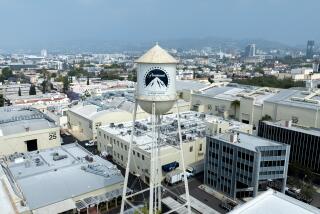KCET and Dominique Bigle’s ‘big’ plans may not be enough
- Share via
A year ago, KCET-TV, Southern California’s longtime PBS flagship and the local home of classy fare such as “Sesame Street” and “Charlie Rose,” took a gamble that baffled many of its viewers: It ended its relationship with PBS.
Since its Jan. 1 exit, bad news has been piling up. Viewers have defected by the thousands; the station now averages just 20,000 tune-ins a night during prime time. Donations from both corporations and “viewers like you” have ebbed. Programming has swung toward an odd melange of foreign-based news, lifestyle shows such as “Kimchi Chronicles” (about Korean cuisine), repeats of British TV series and old movies.
Now, the station is pinning its hope on a high-flying Frenchman named Dominique Bigle, a media investor who is promising to bring new productions to what is now the nation’s largest independent station that will achieve a “level nobody has seen here.” In August, the station announced a five-year, $50-million partnership with Bigle — although the 60-year-old former Walt Disney Co. executive, with characteristic bravado, later said the actual value was even bigger.
“There is an opportunity here to try to use the best of Californian culture, Californian assets — whatever we can create — and creating big shows, big signatures,” the French-born Bigle said during an interview in his Encino office. “That needs money, but I’m used to raising big money for big things.”
The widely reported dalliance with Bigle, however, may solve few of KCET’s long-term problems.
Never a prolific producer of original programming, KCET since January has been forced to rely on shows bought from third-party providers, such as the BBC, Al-Jazeera and Japanese news outlet NHK — a shortcoming the Bigle partnership is designed to help address. But given the station’s enormous programming demands and lack of a network partner, filling the hours will continue to pose a challenge.
“They really have their work cut out for them,” said Martin Kaplan, the Norman Lear professor of entertainment, media and society at USC’s Annenberg School for Communication & Journalism. “It’s a herculean task to create several new programs at once … [and] the audience is so accustomed to equating ‘public broadcasting’ with the programming now on KOCE,” the Orange County-based station that took over the role as the region’s primary PBS carrier.
KCET officials have said that they had no choice but to leave PBS given the onerous dues structure the network imposed. Like other broadcast networks, PBS has also suffered falling ratings, they point out.
But without the familiar PBS lineup, including “NewsHour” and “Frontline,” KCET has been struggling to reach viewers. During October, KCET averaged just 10,000 viewers at any given time each day — a 52% slide since the same month last year, when it was still part of PBS, according to Nielsen.
Its prime-time lineup averaged 20,000, off 41%. Because there is a close association between ratings and individual giving in public television, KCET has had trouble matching its former pledge-drive totals — although station officials counter that November and December are strong months for fundraising.
KCET logged $44.6 million in total support and revenue for fiscal year 2010, the latest figures available, down 26% compared with the previous year, according to audited financial statements. The station reported $53.8 million in “functional expenses,” including programming and administrative costs.
Though the sale of KCET’s landmark studio facility in Silver Lake to the Church of Scientology fetched $42 million earlier this year — a healthy price given the battered real estate market — some of that sum has already been earmarked for retiring debt as well as buying expensive new equipment at the station’s upcoming home in a Burbank high-rise.
“No question, going independent has affected viewer support,” said Gordon Bava, a lawyer and KCET board member, although he added that the station was operating more efficiently and developing local programs. “Corporate support is down, but to some extent, that is a function of the lack of local programming.” A KCET spokeswoman confirmed that individual membership is down but said gifts from “major donors” are up, but would not elaborate.
The association with Bigle — whose achievements include a French version of “The Mickey Mouse Club” — has added a dash of continental flair to KCET, which like most public TV stations isn’t accustomed to developing programs that might play well in Marseilles or Milan. Running about three months behind its internal schedule, the station last week finally announced the first five programs under the Bigle deal, including “Ocean Alive,” a documentary series hosted by Jean-Michel Cousteau, son of legendary marine explorer Jacques Cousteau.
Love of media is in the Bigle blood. The family patriarch was Armand Bigle, a journalist who turned a chance meeting with Walt Disney after World War II into a second career overseeing the Disney Co.’s expansion into Europe. The experience made a powerful impression on young Dominique, who lived with his parents and two brothers in a Parisian flat crammed with Disney memorabilia.
“I grew up with all the animators, the people who were drawing the Mickey Mouse magazine and the merchandising,” Bigle recalled. “To me, Disney is my second family, really.”
After studying law, Bigle joined Disney in 1973. At first he was helping the company find and develop European musical acts, but he branched out into TV and home video, including the launch of Le Disney Channel across France. Meanwhile, he said, he cultivated ties with the company’s executives back in Burbank, including then-Chief Executive Michael Eisner (a spokesman for Eisner, who now runs a private media company and a charitable foundation, said he was unavailable to comment).
In 1990, Bigle formed his own company, United Communications, which snapped up French rights to TV and movie titles from Columbia and MGM/United Artists. The French concern that ultimately became the conglomerate Vivendi bought the company in 1994; Bigle moved to Los Angeles four years later. That sale, plus money left when his father died in 2007, made Bigle a wealthy man, according to one friend.
“He made part of his money the old-fashioned way: He inherited it,” Stephen Unger, an executive recruiter who has known Bigle for years, said. But “he was very successful in business; he did very well with United Communications.”
His latest venture is a small visual effects provider called Eyetronics Media & Studios, which has done work for TV series such as “The Vampire Diaries.” He became chief executive and the company’s largest shareholder earlier this year but declined to provide specifics of the deal.
Bigle is likewise tight-lipped with details of how the KCET programs will be funded, saying only that in addition to “our own source of money,” there would be private equity, pre-sales to foreign territories and possible co-productions with partners. “We are starting to talk with big agents,” he said.
KCET officials say production won’t start until next year.
“Frankly, I’m not sure if he has written checks, but it would have been premature to start writing checks until now,” said Bava, the KCET board member.
“We’re going to be very careful where we’re going to spend the money, how we’re going to spend the money,” Bigle added. “But definitely we are going to get big events, big signatures, big names.”
More to Read
The complete guide to home viewing
Get Screen Gab for everything about the TV shows and streaming movies everyone’s talking about.
You may occasionally receive promotional content from the Los Angeles Times.







